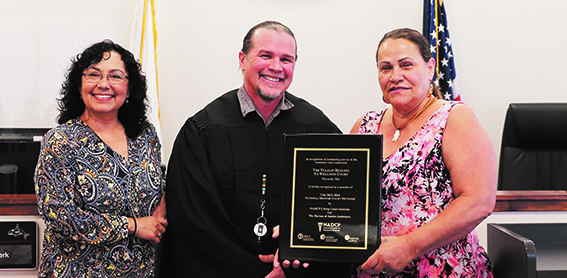
By Kalvin Valdillez, Tulalip News
In recognition of outstanding service to the treatment community, the Tulalip Healing to Wellness Court Tulalip, WA is hereby recognized as a member of the 2022-2024 National Mentor Court Network by NADCP’s Drug Court Institute and The Bureau of Justice Assistance
On the afternoon of June 27, the courtroom at the Tulalip Justice department was filled with multiple people, some hailing from as far away as Arizona. On the hottest day of the year so far, many were in splendid spirits and thankful to be in the comfort of the almighty A/C. About six of those individuals were especially in a good mood, as they are currently on a journey to becoming the best version of themselves, fighting hard to stay on the road to recovery. And thanks to the Tulalip Healing to Wellness Court, they are seeing successful results.
One by one they approached the stand and the first question the judge asked was, ‘how many clean days do you have?’ Ranging anywhere from 36 days to 265 days clean, each person received a resounding and well-deserved round of applause by the entire courtroom when they revealed the amount of days they have remained sober.
The clients then reflected on the past week with Judge Peter Boome. The judge let the clients know if they were in-compliance, and together they discussed all of the weekly tasks the clients have completed, or were meant to complete, such as community service hours, check-in’s with their advisors and team, court-mandated essays, and UA’s.
A few of these individuals, who are just beginning their recovery journey, were experiencing the Healing to Wellness Court’s proceedings for the first time, and this appearance served as either an observation day or an opt-in day. Others have long been participants of the wellness court and were celebrating upwards of hundreds of days clean, that were acquired with the assistance of the Tribe’s wellness court. If the client was 100% in-compliance, they were rewarded with an incentive of their choosing.
Observing the wellness court in-action, was Susan Alameda, the Project Director of the National Drug Court Institute. Once the proceedings were finished, Susan presented an engraved plaque to the tribal court, recognizing the Healing to Wellness Court as an official member of the National Mentor Court Network.
This is the second two-year term in a row that the Tulalip Healing to Wellness Court received this esteemed title. The title allows other courthouses throughout the country, that are looking to improve or begin their own wellness courts in their respective communities, the opportunity to visit and learn from Tulalip’s model.
Said Susan, “At the National Drug Court Institute, we say that these programs are about saving lives. I believe that is absolutely true. There’s an approach to these programs, especially Tulalip’s Healing to Wellness Court, it’s very rooted in community, very rooted in science and research. When you think about families who are able to stay together, or to be reunited, people who turn their lives around from substance abuse and have a second chance, to me, that’s life saving. When they get all that fog out of their system, and they can see themselves and all the things they want to achieve, they become a new person. That is such a beautiful thing to see.”
She continued, “This particular wellness program now has the prestige title of being a mentor court, which is one of very few mentor courts throughout the country. We take great honor in recognizing this court for all of its achievements. The staff played a big role to begin and continue carrying out this program, and [the judges] have been very dedicated, as well as all those who have come before. To be called a mentor court, you really have to adhere to some high standards. And through that, you have the opportunity to play a role in helping shape other courts that are interested in doing something like what’s been going on here.”
The Tulalip Tribes and the Tulalip Justice department first introduced the Healing to Wellness Court at the start of 2017 as an alternative path to the road to recovery for it’s tribal membership. As the heroin and opioid epidemic continues to escalate, skyrocketing in Native America since the pandemic, the tribal Wellness Court program looks to continue to be a source for the people as a means to get clean and escape the battle of addiction.

The tribe tailored the wellness court to meet the needs of their people, and implemented community and cultural work, or ‘give-back hours’, as a requirement to complete the program. And thereby helped re-instill traditional values in many of their clients as well as helping them get re-acclimated back into the community.
In addition to having a strong team of professionals by their side, consisting of judges, attorneys, tribal courthouse officials, TPD officers, drug counselors, and recovery specialists, the client is also reunified with their families, friends, and community along the way. And with a strong support system and a return to traditional Tulalip lifeways, the client has a great chance of completing the 18-24 monthlong program and maintaining their sobriety once they graduate from the Healing to Wellness Court.
Susan presented the plaque to Tulalip Chairwoman, Teri Gobin, who stated, “I would like to thank you on behalf of the Tulalip Tribes. It’s a true honor for our court system. I also want to thank Judge Bass, who was there since the beginning to help bring this forward. And all of the other judges, lawyers, staff, supportive staff, and everyone who has been involved. It’s an honor to receive this prestigious honor for our court system.”
In attendance for the special recognition, and taking note of the court’s proceedings, were representatives of the Muckleshoot Indian Tribe who are in the planning phase of opening their own reservation-based wellness court. The Muckleshoot Wellness Court coordinator, Henry Carranza, is anticipating a ribbon-cutting ceremony as early as September, but noted that a lot of work is still required before they’re able to hold their first hearing.
“A lot of the things happening here at the Tulalip Healing to Wellness Court, we’re going to borrow and implement,” Henry said. “We’re looking to get as much information that we can get and use it for our court. The whole transformation of helping others and watching them turn their lives around will be so worth it. Here at Tulalip, everybody has the same goal of helping the individual turn their life around, everybody works together to help that one person, I think that’s the key.”
The mentor court title will remain in effect through 2024, where if eligible, the courthouse can once again apply to be a member of the National Mentor Court Network and can continue to lead by example for wellness courts nationwide.
While wiping tears from her eyes, Teri expressed, “I think about everybody’s lives that it’s changed – seeing the difference in what has happened with our people. It makes a difference having everybody surrounding you, supporting you. It’s like the medicine wheel. We’re making sure they are whole all the way around, but also keeping them accountable for that first year. I want to thank you for this honor on behalf of our court and the staff who made this possible.”